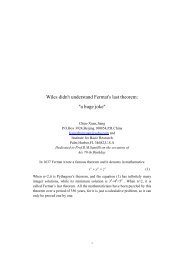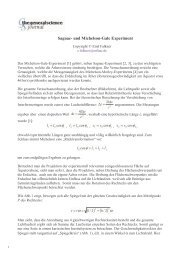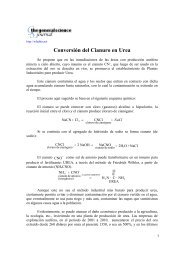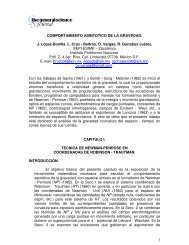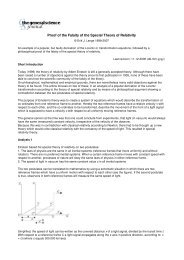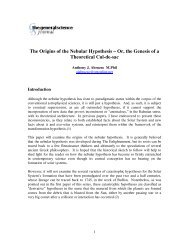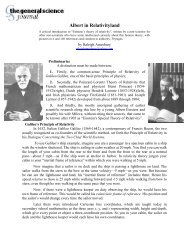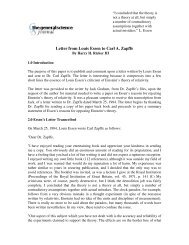MAGNETISM DURING THE SEVENTEENTH CENTURY HH Ricker III
MAGNETISM DURING THE SEVENTEENTH CENTURY HH Ricker III
MAGNETISM DURING THE SEVENTEENTH CENTURY HH Ricker III
Create successful ePaper yourself
Turn your PDF publications into a flip-book with our unique Google optimized e-Paper software.
magnet was smeared with garlic, it would no longer attract iron, because the garlic prevented the<br />
species of the stone from being represented to the iron as it was-rather quite differently, since<br />
garlic is destructive to iron, making it rust and deteriorate if it is anointed with garlic juice. The<br />
magnet turns towards the poles, because there are mountains of iron and magnet there, as<br />
sailors testify.” 1<br />
This argument so strongly resembles the argument of Henry of Langenstein that one suspects he<br />
is copying from Henry’s book. The basic flaw is that it was proved experimentally by Cardan,<br />
Porta and Gilbert, that garlic has no effect on the action of the magnet or the compass. However,<br />
we see the persistence of this false belief along with the old idea that the compass points towards<br />
mountains made of iron and the magnet. The author can be excused for being ignorant of the<br />
change of the declination, which clearly showed that the direction towards which the compass<br />
points is constantly changing, because this discovery was not announced until the following year.<br />
His resistance to Gilbert’s explanation shows that Gilbert’s work did not have sufficient<br />
influence to alter the old ideas.<br />
In 1621, Jean Bapiste van Helmont published in Paris a book that seems more in the realm of<br />
natural magic than experimental science. De Magnetica is a medical book on the magnetic cure<br />
of wounds. This is a subject that Gilbert roundly criticized and ridiculed. Van Helmont is clearly<br />
a follower of Paracelsus, but the many disproofs of Paracelsian ideology regarding magnetism<br />
did not deter Van Helmont. His approach to magnetism is within the spirit of natural magic. He<br />
tells us that magnetism:<br />
“... is an unknown property of a heavenly nature, very much resembling the stars, and not<br />
at all impeded by any boundaries of space or time... Every created being possesses his own<br />
celestial power and is closely allied with heaven...the spirit is everywhere diffused; and the spirit<br />
is the medium of magnetism...it is not the spirits of heaven of heaven and of hell which are<br />
masters over physical nature, but the soul and spirit of man which are concealed in him as the<br />
fire is concealed in the flint.” 2<br />
Van Helmont was clearly familiar with William Gilbert’s On the Magnet which he praises by<br />
saying:”no man ever writ more judiciously or experimentally”. But, he persists in saying that:<br />
”The loadstone onely by the affriction of Garlik, amits its verticity, and neglects the pole...The<br />
reason, because Garlik is the loadstones proper Opium, and by it that spirituall sensation in the<br />
magnet is consopated and layd asleep...” 2<br />
Despite the many disproofs of the garlic story, belief in its truth continues with Van Helmont.<br />
Van Helmont’s book clearly shows his understanding of the difficulties regarding magnetism.<br />
These facts persuade him to believe in the spiritual nature of the magnetic force. One of his more<br />
convincing “proofs” is the following:<br />
”Doth not the needle of the Mariners compass, through a firme glasse, closely sealed up<br />
with melted soder (in which there can be no pore or cranny discovered) steer it self to the Artik<br />
pole?... wherefore the same numericall accident streaming in one continued radius from the



